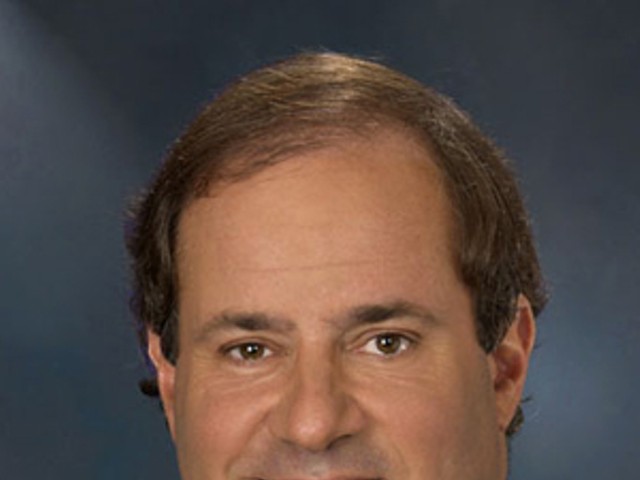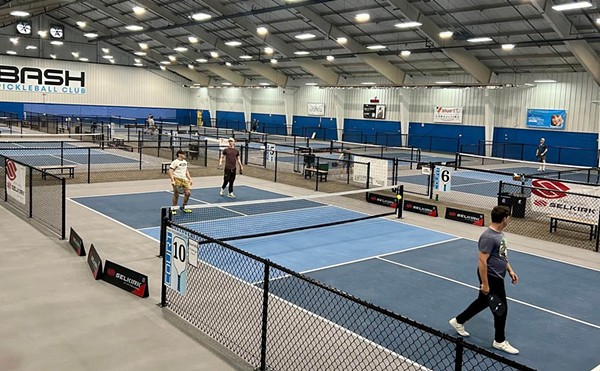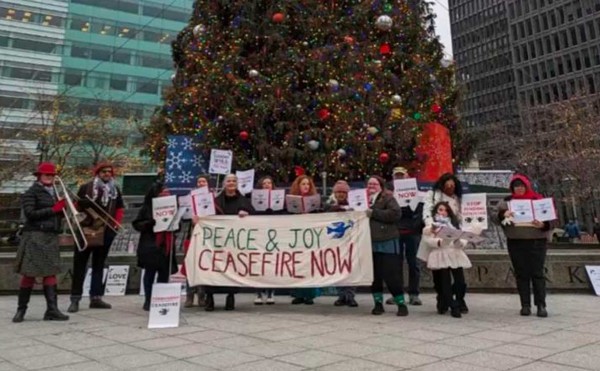Classmates Even Yaaqoub and Maryam Bkla know they're safe at Sterling Heights High School. That wasn't the case in their native Baghdad. Classes were canceled for Even when bombings were too close — he remembers hearing the explosions while in class. Maryam says everyone in Iraq knows someone who's been injured or killed in the violence that's followed the U.S. invasion. A cousin was shot several times but survived, losing an eye.
"It's all because of the war. We couldn't stay because they were kidnapping and killing people," she says.
Similar stories are told by the hundreds of Iraqis who've resettled in metro Detroit during the last two years as the United States finally opened to these refugees of the war in Iraq. Next year more are expected to join the largest community of Iraqis outside of Iraq. Hurried and dangerous departures, family separations and efforts to rebuild lives ... these are the stories that tug at heartstrings, for local Iraqis.
"It's so hard," says Tamara Dabish, an American-born Iraqi who works as a teacher's aide in Even and Maryam's English classes. Her eyes fill with tears as she listens to the teens. "That's what my parents came from. I feel really emotional about it."
Sister Beth Murphy, volunteer services coordinator at the Archdiocese of Detroit, says she sees a "collective grief" among Iraqi-Americans for their homeland and what it has suffered: war, dictatorship, more war and now another wave of displaced people.
"Iraqis, no matter how long they've been here, are still to some extent mourning what's happened in their homeland," she says. "I think all displaced persons do, but in this case it's really strong."
Haider Ala Hamoudi, a University of Pittsburgh law professor who's written a book about his attempts to help rebuild his ancestral homeland, says the recent exodus to America is a reminder of the economic, cultural and political stagnation in Iraq under Saddam Hussein, the Office of the United Nations sanctions of the 1990s and the American war of this century.
"They're a metaphor for some of the misery that exists in Iraq," he says.
Embedded
Until two years ago, the U.S. government was reluctant to admit Iraqis as refugees. Critics say that was to avoid admitting how disastrously wrong the U.S. invasion had gone. The United Nations High Commissioner for Refugees (UNHCR), for instance, estimates that more than 2 million Iraqis have been displaced within the country and more than 2.7 million have fled the country; most of those people moved under duress following the 2003 invasion, according to the UNHCR. And despite the reduction in violence following the U.S. troop surge earlier this year, the exodus continues, creating one of the biggest forced migrations since World War II. Much of it has been out of sight in the United States as the Iraqis have remained in other Middle Eastern countries or found refuge in Europe.
In the fiscal year ending Sept. 30, 2006, there were just 189 Iraqis among the 41,053 refugees who came to the United States.
But in 2007, the U.S. State Department — which sets numbers in consultation with the president — began allowing Iraqi refugees to come in greater numbers. About 1,600 arrived in fiscal 2007; 13,823 came by the end of fiscal 2008. Some 17,000 are expected in fiscal 2009.
With Michigan's large Iraqi community, many refugees have asked to come here or were sent to the state because they have a close relative here. In 2006, just 24 Iraqis came to Michigan with refugee status. In 2008 there will be more than 2,200, according to the Office of Refugee Resettlement in the U.S. Department of Health and Human Services.
"With all the war and destruction they had there, they're coming here and saying, 'Our life was destroyed, but I really want my kids to have a stable and safe life,'" says Al Horn, director of refugee services in Michigan's Department of Human Services.
"Each of them has their story to tell as to why they're displaced and can't go back to their homeland," David Siegel, acting director of the Office of Refugee Resettlement, says of the 80,000 refugees from around the world who'll come to the United States in 2009, about 20 percent of them Iraqis.
"That's one of the great things about America, to find a way to bring in people like this."
State Department spokesman Todd Pierce says it's too early to say how many of those Iraqis will come to Michigan next year. Given the numbers here already and Michigan's worsening economy, only Iraqis with immediate family members — parents, siblings or children — are currently placed in Michigan. That doesn't preclude refugees first placed in other parts of the country from moving to Michigan later.
"They could all decide they want to be in Detroit," Pierce says.
'They're scared'
The largest group of Iraqis in metro Detroit are Chaldeans — members of a Catholic sect whose population is concentrated in northern Iraq. Considered one of the oldest ethnic groups in Iraq — speaking Aramaic, which many believe to have been the language of Jesus — they lived there before Islam swept through the area in the 8th century. Chaldeans, who now number about 113,000 in the area, began arriving in the 1920s to work, like many other immigrants, in auto factories. As their numbers grew, they established a vibrant community characterized largely by its religious institutions, now scattered around Detroit and the suburbs. Business networks that started with grocery stores now include real estate, hotels and other ventures. Many families here maintain strong relationships with their relatives in Iraq.
Mary C. Sengstock, is a Wayne State University professor of sociology who has studied and written about the Chaldean community for nearly 50 years. Sengstock says that changes in immigration law in the 1960s increased the number of newcomers allowed from the Middle East, and Detroit's Chaldean community grew significantly during the 1970s.
Other waves came during Saddam Hussein's regime, after the first Gulf War in the early 1990s and later that decade when UN sanctions limited the supplies of food, medicine and other goods.
Yet for all the horror Saddam perpetuated — torture of political opponents and genocide aimed at the Kurds of northern Iraq, for example — Sengstock says the Christians felt it no worse than the Muslims. Persecution was based on political opposition to Saddam, not necessarily religion. Suffering under the UN sanctions was nearly universal.
Sengstock describes the earlier Iraqi immigrants as being "pulled" to the United States by education and employment. Now, she says, they're being "pushed" out of their home country.
"They're scared," she says. "The Christians are now hated by everybody."
Culture shock and awe
Minority groups such as Chaldeans are facing some of the worst victimization in Iraq today because insurgents associate their Christian religion with Americans, says Basil Bakal, a businessman who volunteers with the Chaldean Federation's Adopt-a-Refugee program, which has raised nearly $600,000 mostly from the Detroit-area community in less than two years to help displaced Iraqis.
He points to the kidnapping and subsequent killing of the Chaldean bishop of Mosul earlier this year, and the destruction of churches and bombings in Christian neighborhoods. "The Christians of Iraq got a double hit," Bakal says. "They were there before the U.S. military, before Islam, before Christianity. They're the indigenous people of Iraq, but now they're associated with the U.S. military in Iraq."
The country today bears little resemblance to the peaceful, democratic state U.S. officials said would follow the toppling of Saddam Hussein's regime.
"The thought of a democracy as a new situation in Iraq is nice, but practically you don't see it," says Father Manuel Boji, the priest at Mother of God Chaldean Church in Southfield, founded in Detroit in 1948 as the first Chaldean parish in Michigan. "The outcome in Iraq was too bloody and too ... damaging."
Hamoudi, an American whose parents were born in Iraq, and a professor of law at the University of Pittsburgh, has worked in Iraq as an attorney both independently and with the U.S government since the military occupation. His experiences are detailed in his book Howling in Mesopotamia. He says the United States failed to control the chaos of the early days of the invasion, leading to the country's still unsettled state. "There are any number of decisions that were made that have left Iraq vulnerable," he says.
And once lawlessness begins in such a situation, he adds, "the most vulnerable parts of the population are the ones that are going to be in trouble."
Chaldeans were among the groups hard-hit, and after the violence against them began, he says, "there was almost nothing we could do there. Trying to protect the Christians could have only led to more resentment."
That situation leaves Chaldeans here with unique, self-imposed duties both as Iraqi "family" and as part of the United States, says Bakal.
"I feel as Americans we have a special responsibility above and beyond any other nation because it's our forces that invaded Iraq. It's our forces that put these people in the situation they're in today. We have a moral obligation to help restore their lives or at least help them find peace and some sense of stability," he says.
Bakal's program sends funds to refugees in Jordan and Syria, estimated to number at least 1.7 million in September 2007 by UNHCR. Some have spent months or even years there, with adults unable to find work, children without school and all without medical care. From there, some of them move to Europe or the United States, with about 1 in 5 who land in America coming to Michigan, according to the U.S. Office of Refugee Resettlement.
Most of Detroit's new arrivals have family here in the Chaldean community, but a handful have come alone, including Kasem Hassan. A native of Mosul in northern Iraq, Hassan left his homeland in 2007 and found work in a Turkish hotel where he supported himself while the UNHCR and the U.S. government considered his case.
Hassan is a Yazidi, a religious sect — neither Christian nor Muslim — that believes in a single god who is sustained by a hierarchy of subordinate beings including humans who will be perfected through a succession of lives. Yazidis worship an angel in peacock form named Malak Ta'us, whom they believe God left in control of the Earth. Many Muslims consider Yazidis to be devil-worshippers. In a well-publicized 2007 incident in Mosul, a Yazidi woman was stoned to death by her own community because she married a Muslim man. Muslims retaliated, beating and killing Yazidis in the area. Hassan, who worked selling electric parts, received a letter threatening his life.
"It was a bad situation in Mosul. I was working there. They wanted to arrest me because I belong to the Yazidi religion, that's why," he says through a translator.
He left for Turkey. "I could not deal with the people in Iraq and Mosul. It was a bad situation. They threatened me."
He was accepted as a refugee and placed in Michigan in April. "I'm solo, it's just me," he says in English. He works night shifts in a bakery, studies English and talks to his family often.
His first glimpse of Detroit was an Internet picture on Google Earth. "It was very clear to see America, the parks, the streets. I saw all the lakes, the lights," Hassan says, continuing in English. "I'm very happy to come here because it's a freedom country."
Flight from Baghdad
After intense lobbying from the Chaldean Federation and others, in 2007 the federal government made it easier for Iraqis who worked for the U.S. government or its contractors to emigrate here.
"They're coming in as cases where they've been persecuted," says Horn in the Michigan office. "Basically if they've had any affiliation with the United States, they don't feel that they can stay there."
One of those cases was "Sam," who asked that his real name and his wife's be kept secret, citing concerns for the safety of his family remaining in Baghdad. He decided to leave after a mysterious call at his Baghdad home where he lived with his young wife and toddler son. The caller — unidentified — wanted a list of Iraqis who worked at the American company that employed Sam, a Chaldean.
"They had all the information about me, everything. What time I was coming, going, leaving home. My father's and mother's names," says Sam. "They wanted all the information, what the Iraqis were doing, what we see, what happens."
It wasn't the first time Sam had felt threatened.
Twice Sam was followed from his home by a car of armed men who drove away only after Sam joined military convoys. Another time, a man came to the house claiming to be from the government and questioning his wife, "Jasmine," about his work. Six of Sam's co-workers were killed after being followed on the streets. Others close to him had experiences similar to his.
"Three of my neighbors were called and threatened so they left for Syria and Jordan," Sam says.
After the phone call in July 2007, Sam and Jasmine, both in their mid-20s, knew it was their time to flee.
"I went to work for three days so ... they would think everything would be normal. I arranged for cars so we can flee. We went to my uncle's house in Baghdad for two days," says Sam, speaking through a translator.
After paying a driver $650 each for himself, Jasmine, their child and Jasmine's brother, they rode in a Suburban across a hot Iraqi highway. For six hours they drove in near silence, hoping they wouldn't be stopped. Hidden among folds of clothes in their luggage were photos and papers proving Sam had worked for the Americans. These documents would be needed to make their case that Iraq was unsafe for them and that they deserved to be admitted to the United States as refugees. "Even the driver didn't know about them," Sam says.
That would amount to a death sentence if discovered by insurgents who were known to attack vehicles along the road to Syria. But after reaching the border safely and paying a $50 per person bribe, the family traveled safely to Damascus. They found an apartment and lived off their savings for several months, applying almost immediately to come to the United States. Jasmine's parents, after waiting 14 years, had immigrated here in 2004, so they knew their chances were good.
In Damascus they lived in a furnished apartment in a neighborhood full of other Iraqis. But no one shared stories. Sam says Iraqis are private by nature, not sharing details of their lives with strangers. They also don't want it widely known if they've worked for Americans, at one extreme, or were pro-Saddam, at the other.
When the savings ran out, Jasmine's parents sent money. Meanwhile, Sam and Jasmine went through a series of applications and interviews with UN and State Department officials. "They asked me about my whole life," Sam says. He was fingerprinted, reinterviewed to make sure his stories matched and checked.
This summer they got final acceptance as refugees along with their first choice for a destination: the United States. "There is a community here and I wanted to be with my family again," Jasmine says.
They arrived in August.
Sam works an afternoon shift in a warehouse and the only day he's had off was Halloween, the family's first. They dressed their son as a tiger and trick-or-treated in their Oak Park neighborhood. Sam doesn't mind working long hours, but he'd like to take English classes. "The hardest thing is the language," he says.
He speaks some English — having learned it in school and from the Americans he worked with in Iraq — but can't read or write very well. "I can't read a newspaper so how can I search for a job?" he says. Jasmine will take English beginning in January, picking up where she left off after a few years of classes at her Baghdad high school. "It's going to be hard," she says. "But it's OK."
She's hoping when her son starts preschool and begins learning the language that he'll help her. "He's going to be American," she says.
Hearts and minds
Sam and Jasmine are being helped by Lutheran Social Services of Michigan, one of three of the local agencies in metro Detroit that assist the refugees with resettlement. As new arrivals, refugees receive cash assistance, Medicaid and food stamps for eight months. If there are children in the home, the benefits are extended. A single person would receive about $305 a month in cash, and a family of four would receive $593, Murphy says.
The three local aid organizations — in addition to Lutheran Services, the Archdiocese of Detroit and the U.S. Committee for Refugees and Immigrants — contract with state government and help refugees find housing and jobs and can offer training. Caseworkers help with paperwork, applications, translation, school registration and transportation.
The state office of Refugee Resettlement administers the Medicaid and cash assistance programs paid for by the federal government. The reimbursement in 2008 was about $1.7 million.
Local school districts have had to adjust to the new student population as well, particularly Warren Consolidated, Oak Park and Utica schools, which have the highest number of recent Iraqi immigrant students.
At Sterling Heights High School, Lori Rice's English Language Learner class has added students as recently as three weeks ago. In second-hour English, where Even and Maryam study, 21 of the 24 students are from Iraq, most of them refugees.
Most of them have missed several months of school or more, Rice says. Some quit attending in Iraq years ago when the war and violence made school unsafe. Others missed school while they lived in other Middle Eastern countries and waited to come here.
"Most of them have no knowledge of things like lockers. We have to teach them how to work the combination locks," Rice says.
Shortly after they arrive, all refugees in metro Detroit also are screened at the medical clinic operated by Arab Community Center for Economic and Social Services (ACCESS), where physical and mental health problems are identified and treated.
ACCESS also operates a Torture Treatment Center, paid for with a $450,000 federal grant. The center has about 280 patients who come mainly from Africa and the Middle East.
"The center has treated Iraqis who were tortured under Saddam Hussein and now we have post-traumatic stress disorder war victims," says Abdallah Boumediene, the community health and research center operations manager. Others become depressed while they adjust to life in America.
"They're not uneducated or unintelligent people but they have to start from scratch," Boumediene says. "They end up on our doorstep and they need services."
Home in the heartland
The inherent challenges to resettlement, though, are made somewhat easier by the various charitable projects of Michigan's Iraqi community. The Chaldean Ladies of Charity, for example, have created a warehouse of donated clothes, household items and furniture that help the newcomers establish homes. The Adopt-A-Refugee program solicits donations at community events, churches and local businesses.
Traditionally, Michigan's Chaldeans have maintained strong connections to Iraq, says Sengstock, which translates to a better adjustment for the newly arrived Iraqis. "They have an asset that other refugees don't have, that is, they have strong ties here," Sengstock says.
Dabish, the Sterling Heights High School teacher's aide, feels those ties even though she's never been to the country where both her parents were born. When she listens to stories by the new Chaldean refugees, such as those of her students, she can't help but react.
The students trust her and find comfort in being able to speak to her in their mother tongue. The tell her about parents injured in the violence back home — and about their struggles finding housing in their new homeland.
The other day, as she listened to Even and Maryam's stories about fleeing Iraq, she had to step away to hide her tears from them.
"I just want to take all these kids home with me," she says.
In many ways, she has.
Sandra Svoboda is a Metro Times staff writer. Contact her at 313-202-8015 or [email protected]




